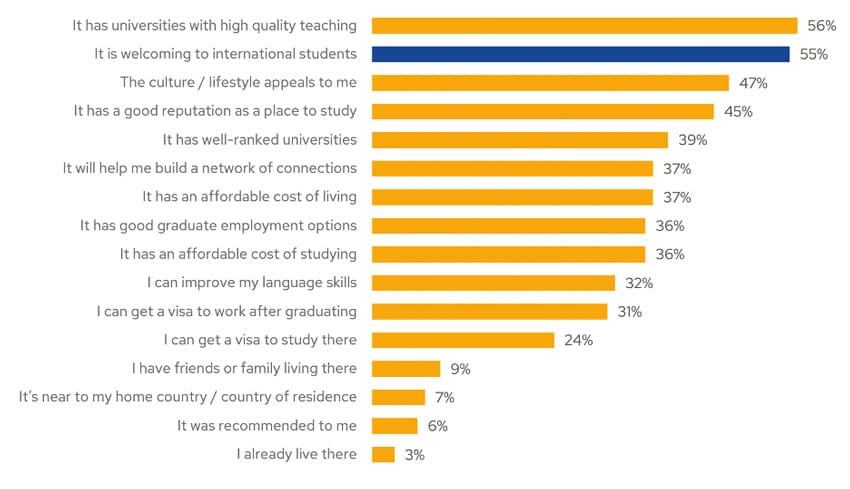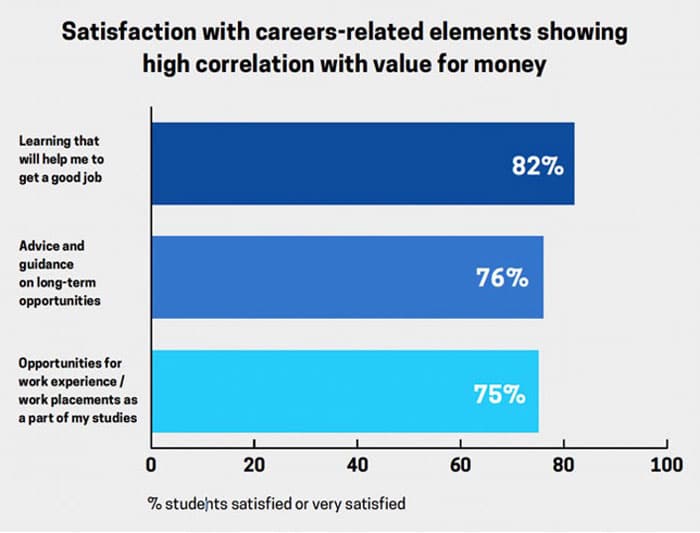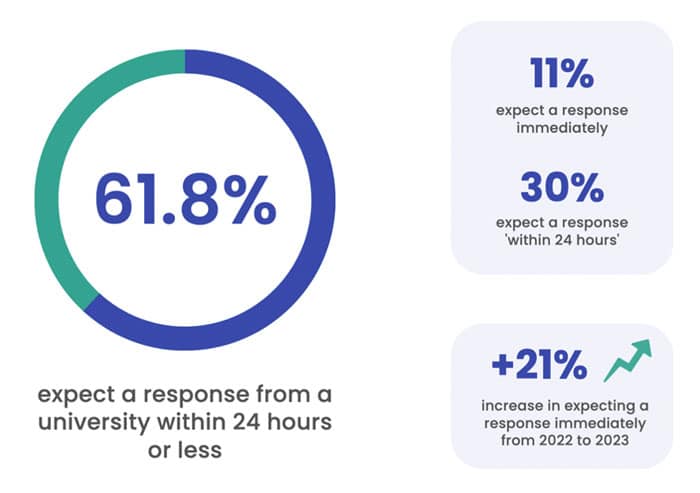Five student research insights to keep in mind going into 2024
- A round-up of key research findings to guide planning and strategy over the year ahead
- These insights concern student motivations, career services, use of agents, feelings about mental health counselling, and expectations regarding how quickly they should receive answers to their enquiries
Every so often, it’s helpful to look up from a current international student recruitment strategy and evaluate whether it needs tweaking. An important resource in this regard is current research on the motivations, barriers, concerns, and priorities of prospective and current students across the world.
Today, we’re surfacing a few key statistics from three major global initiatives to keep in mind as you begin thinking more about the shape of your strategies in 2024. The reports are:
- Keystone Education Group’s State of Student Recruitment 2023, conducted with 23,856 students in all world regions, with African, Asian, and European students the largest segments (54%, 18% and 14%, respectively).
- QS’s International Student Survey 2022, conducted with 110,000 prospective international students from 194 countries and territories. Student responses were collected in partnership with 94 universities and organisations from 21 countries.
- The 2022 edition of i-graduate’s International Student Barometer (ISB), conducted with 98,200 foreign students studying in 15 countries.
Insight #1: Culture and welcoming environment are top motivations for choosing a destination
The past couple of years have been ones in which many families considering study abroad have had to think more about affordability more than they would like. As always, they consider the quality of education, work opportunities, visa processes, and other practical elements when deciding which destination to choose. But it would be a mistake to forget the emotional aspect of their decision-making.
The following graphic from QS’s Global International Student Survey 2022 reminds us that students want to have the time of their life when in another country for language studies, school, college, or university. As you can see, a destination’s reputation for being welcoming to international students and having an appealing culture are the second and third most important factors for prospective students. “High-quality teaching” edged out “welcoming” by just one percentage point.
Many institutions are leveraging the voices of current international students and alumni when it comes to communicating that their institution is safe, welcoming, and fun. This year, “current students” emerged as the top recruitment resource being used by US colleges and universities in a snapshot survey conducted by the Institute of Higher Education (IIE).

Insight #2: Career services must be an organizational priority
The 2022 International Barometer Survey (ISB) found that while 96% of first-year international students said that they chose where to study based on future career impact, only 66% of final year students said they felt well prepared for their career. Commenting on that discrepancy, Nanette Ripmeester, director of i-graduate for North America and Europe, suggested that those institutions that increase student satisfaction on this measure will gain a competitive edge:
“The institution that manages to combine dedication for learning with preparation for the future world of work, is the institution that is able to attract the ‘sustainable generation.’ This generation is highly aware of scarcity in their entire thinking and convinced they have got just one shot at getting it right. And the right career path seems one of these choices they have to get right.”
The ISB team performed a fascinating analysis of the correlation between a student agreeing that their institution had prepared them for their career and agreeing that they had received value for money in having studied at that institution. Those students were also statistically more likely to recommend the institution to other students. Peer-to-peer influence is now considered to be one of the top factors influencing where prospective students study abroad, so this finding is incredibly important.

Insight #3: Mental health is a complex, but crucial, area for schools to address
The QS survey found that more than 6 in 10 students consider support for mental health and mental health counselling important aspects of a university’s services, but many students wouldn’t feel comfortable asking for help.

Similarly, the 2022 ISB survey found that only 1 in 6 international students had accessed mental health supports. A fascinating project completed by the University of Melbourne solicited the feedback of 600 of its graduate students from 47 countries to find out how the university could improve uptake of its mental health services. You can see some of the students’ recommendations here.
Insight #4: Nurture your agent channel
More than half of African (53%) and Asian (55%) students responding to Keystone Education Group’s State of Student Recruitment 2023 survey said they planned to use an education agent in their study abroad planning and process.
The implications of high agent use in Asia and Africa are these:
- The agent channel is integral to having a strong local presence and to attracting students from emerging markets.
- Consulting Best Practice Guides for working with agents is imperative. There are a number of these, including AIRC’s, ALTO’s, and NACAC’s. Also interesting is a guide the British Council put together for students considering how to choose a good agent to work with. There are also a number of agent training courses available, including those offered by ICEF Academy. Look for agents who have completed and passed recognised courses and who have achieved certifications when determining which agents to work with.
- There is a wide variety of agents out there. The best agents are highly professional and invested in their jobs and the success of the institutions they work with. Strong communications, regular training, and clear contracts are the fundamentals of a healthy institution-agent relationship.
Insight #5: Consider AI-automated tools to boost inquiry and admissions processes
The next graphic, from Keystone Education Group’s State of Recruitment 2023 report, is the strongest prompt we can imagine for reviewing recruitment and admissions staffing, processes, and technologies. A mix of human and AI-assisted responses to student enquiries is ideal, so that staff can be freed from tedious but important tasks in order to attend to more complex and human work (e.g., real conversations with students) and so that students receive timely answers. For more on the role of AI, we suggest this article from our archive.

For additional background, please see:
- Working with Education Agents Course from ICEF Academy: Learn how to build and manage successful partnerships with agents
- “Reimagining career services for international students”
- “Education agents poised to play a greater role in international student recruitment”
- “Data shows that machine learning can boost international admissions conversions”
- “Do international students face greater barriers in accessing mental health supports?”
- “Integrating mental health supports throughout the student journey”















